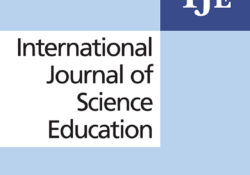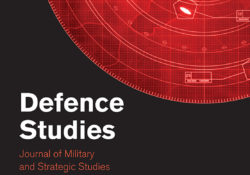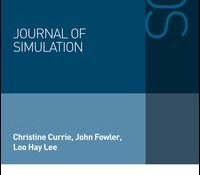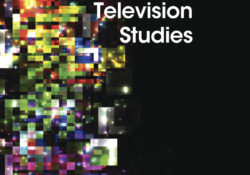tandfonline.com har udgivet en rapport under søgningen „Teacher Education Mathematics“: ABSTRACT Formulae display:?Mathematical formulae have been encoded as MathML and are displayed in this HTML version using MathJax in order to improve their display. Uncheck the box to turn MathJax off. This feature requires Javascript. Click on a formula to zoom. ABSTRACT We derive a measure of the relatedness between economic activities based on weighted correlations of local employment shares. Our approach recognizes variation in the extent of local specialization and adjusts for differences in data quality between cities. We use our measure to estimate activity and city complexity, and examine the contribution of relatedness and complexity to urban employment growth in New Zealand. Relatedness and complexity are complementary in promoting employment growth in New Zealand’s largest cities, but do… Continue Reading →
Like this:
Like Loading...
eric.ed.gov har udgivet: PreK-12 teachers in an urban school district enrolled in a course designed to examine the complexities of teaching in urban schools. This course was part of a grant aimed at increasing math and science achievement of their students. Teachers critically examined local and national policies and conditions that added to the complexities of their students‘ lives. They examined school and district systemic practices that also created complex environments in which to teach. This qualitative study describes their understandings and the often simplistic view of education that contradicted what they were learning about. (Contains 1 table.) Link til kilde
Like this:
Like Loading...
tandfonline.com har udgivet en rapport under søgningen „Teacher Education Mathematics“: ABSTRACT ABSTRACT The theoretical framework of complexity is beginning to attract wider attention in research on the armed forces, and consequently the views of those who face complexity on the ground should be explored in more detail. Failure to do so risks complexity remaining only a top-level theory lacking adequate connection to practice. This article seeks to address this issue through analyzing the views of Finnish military officers. Data for the research were gathered using a deliberation and data collection method called a security café. A total of 74 people, most of them holding the rank of captain in the army or air force or lieutenant senior grade in the navy, attended the security café. The data used in this… Continue Reading →
Like this:
Like Loading...
tandfonline.com har udgivet en rapport under søgningen „Teacher Education Mathematics“: ABSTRACT Formulae display:?Mathematical formulae have been encoded as MathML and are displayed in this HTML version using MathJax in order to improve their display. Uncheck the box to turn MathJax off. This feature requires Javascript. Click on a formula to zoom. ABSTRACT Gaming simulations (games) for policy and decision making have been the neglected “sibling” of educational and training games. The latter have experienced a widespread usage by practitioners and researchers, while the former have had limited, yet slowly increasing, adoption by organisations. As a result, various issues developing and using these games remain unaddressed. This includes the design of games, their validation, the actual game sessions, and applying the resulting knowledge from games in organisations. In this paper, solutions… Continue Reading →
Like this:
Like Loading...

tandfonline.com har udgivet en rapport under søgningen „Teacher Education Mathematics“: ABSTRACT ABSTRACT Recent research on motivation to learn science shows that science teaching usually supports students’ systemising, but not their empathising cognition. In this paper we argue that empathy, with due caution, should be emphasised in science learning more seriously and consistently, particularly in a Science|Environment|Health pedagogy that aims at fostering the mutual benefit between the three interlinked educational fields. After briefly recapitulating research results about the empathising-systemising (E-S) theory and motivation to learn science, the paper describes the science of empathy and then reflects on the opportunities and challenges of introducing empathy into science teaching. Many studies of effective science learning can be found that involve empathising, though this usually is not made explicit. Thus, bringing empathy into play… Continue Reading →
Like this:
Like Loading...

tandfonline.com har udgivet en rapport under søgningen „Teacher Education Mathematics“: ABSTRACT ABSTRACT Providing differentiated instruction (DI) is considered an important but complex teaching skill which many teachers have not mastered and feel unprepared for. In order to design professional development activities, a thorough description of DI is required. The international literature on assessing teachers’ differentiation qualities describes the use of various instruments, ranging from self-reports to observation schemes and from perceived-difficulty instruments to student questionnaires. We question whether these instruments truly capture the complexity of differentiation. In order to depict this complexity, a cognitive task analysis (CTA) of the differentiation skill was performed. The resulting differentiation skill hierarchy is presented here, together with the knowledge required for differentiation, and the factors influencing its complexity. Based on the insights of this… Continue Reading →
Like this:
Like Loading...
tandfonline.com har udgivet en rapport under søgningen „Teacher Education Mathematics“: Abstract Abstract This essay complements my earlier symptomatic, sociological and economic reading of mind-game films (‘The Mind-Game Film’ 2009) with a reassessment of their status as a privileged (though minoritarian) object of study for contemporary cinema from a philosophical perspective. This essay also updates the analysis given in the 2009 essay, mindful that there have in recent years been a number of popular big-budget films that qualify as mind-game films. Finally, the essay presents twelve key features of mind-game films: (1) multiple universes, (2) multiple temporalities, (3) causality between coincidence and conjunction, (4) feedback: looped and retroactive causalities, (5) mise–en–abyme constructions, (6) the observer as part of the observed, (7) living with contradictions, (8) imaginary resolutions no longer dissolve real… Continue Reading →
Like this:
Like Loading...
tandfonline.com har udgivet en rapport under søgningen „Teacher Education Mathematics“: Link til kilde
Like this:
Like Loading...
tandfonline.com har udgivet en rapport under søgningen „Teacher Education Mathematics“: ABSTRACT ABSTRACT This article focuses on the emerging complexity that schools and teachers are currently addressing – a complexity that comprises one of the key characteristics of society today. The article explores how teachers in primary school experience the opportunities and challenges posed by the use of tablets in terms of implementation, learning activities and classroom management. In group interviews teachers at two Norwegian primary schools thematise these issues. We argue that there is a need to elucidate the subjective interpretations of technology if we are to understand how teachers integrate tablets in teaching. The article highlights how and why we have to develop a wider understanding of the new complexity, which can make situations in the classroom unpredictable and… Continue Reading →
Like this:
Like Loading...
tandfonline.com har udgivet en rapport under søgningen „Teacher Education Mathematics“: Abstract Formulae display:?Mathematical formulae have been encoded as MathML and are displayed in this HTML version using MathJax in order to improve their display. Uncheck the box to turn MathJax off. This feature requires Javascript. Click on a formula to zoom. Abstract Students often struggle with the concept of dependence of events or random variables. We present a simple coin flipping game that yields surprising results due to the dependencies within the game. The game is simple enough for young children to understand and play, yet complex enough to yield results that are counterintuitive to even most graduate students. We discuss how to implement the game in a classroom, suggest two problems from the game for students to solve, and… Continue Reading →
Like this:
Like Loading...








